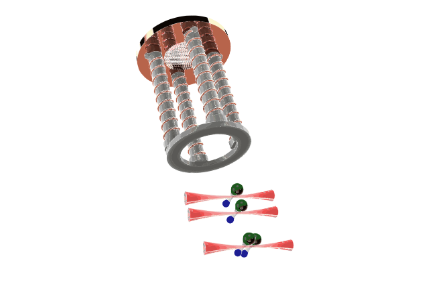Microwave shielding of ultracold molecules
Tijs Karman RU Nijmegen, the Netherlands.
Ultracold polar molecules are a promising platform for applications such as precision measurement, quantum computing, and quantum simulation. In typical experiments, the molecules’ lifetime is limited by loss due to molecule-molecule collisions. These losses prevent evaporative cooling of molecules and spoil resonances that could otherwise be used to tune interactions.
In this talk I will discuss “microwave shielding”, a scheme for inducing repulsive interactions between molecules that protect them from collisional loss [1]. Microwave shielding has recently been realized experimentally [2]. Shielding not only suppresses collisional loss, but also boosts elastic collisions. This enables evaporative cooling of fermionic NaK molecules to quantum degeneracy [3]. I will also discuss recent results on controlling interactions between microwave-shielded molecules [4].

Figure 1. Microwave shielded CaF molecules in optical tweezers
[1] Karman and Hutson, PRL 121, 163401 (2018)
[2] Anderegg et al. Science 373, 779 (2021)
[3] Schindewolf et al. Nature 607, 677 (2022)
[4] Chen et al. arXiv:2210.13324